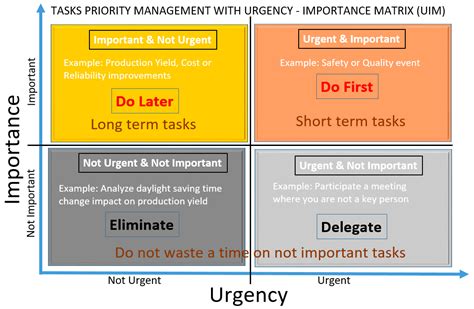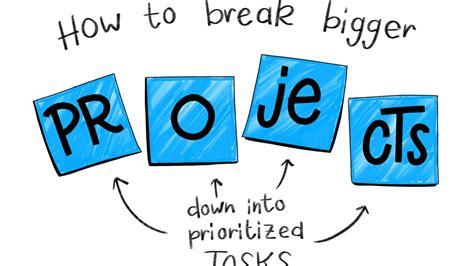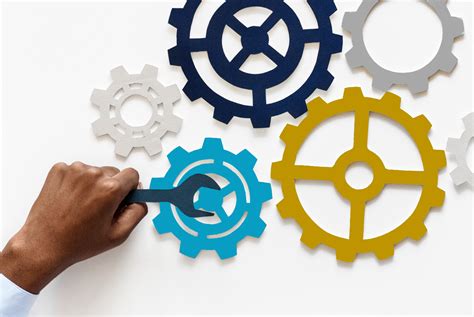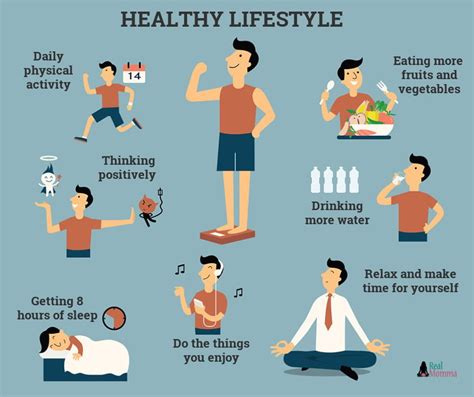In today's fast-paced world, time is a precious resource that should be carefully managed. Whether you're a student, a professional, or simply someone seeking a better work-life balance, mastering the art of time management can significantly enhance your productivity. By identifying and implementing effective strategies, you can streamline your daily tasks, eliminate distractions, and ultimately achieve more with the same amount of time.
The key to unlocking your full potential lies in understanding the principles of time optimization. By utilizing smart techniques, you can maximize your efficiency and minimize wasted effort. This article aims to provide you with valuable insights into effective time management methods that can be easily applied in your daily life. From prioritizing tasks to utilizing technology wisely, the tips shared here will empower you to take control of your time and use it to its full potential.
One of the fundamental aspects of time optimization is prioritizing tasks. Time is a limited resource, and we often find ourselves with more tasks than can realistically be completed in a day. By understanding the importance and urgency of each task, you can allocate your time and resources accordingly. This involves identifying high-priority tasks that require immediate attention, as well as those that can be delegated or postponed. An effective strategy is to utilize the Eisenhower Matrix, which categorizes tasks into four quadrants based on their urgency and importance. By focusing on tasks that fall in the important and urgent quadrant, you can ensure that your time is devoted to activities that truly matter.
In addition to prioritizing tasks, another crucial element of time management is effective planning and organization. By setting clear goals and breaking them down into smaller, actionable steps, you can create a roadmap to success. This not only helps you gain clarity on what needs to be done but also enables you to track your progress and make adjustments as needed. Implementing a reliable system, such as using a digital or physical planner, can further aid in keeping your tasks organized. By allocating specific time slots for each activity and avoiding overcommitment, you can work more efficiently and prevent the accumulation of unfinished tasks.
Prioritize tasks based on importance and urgency

One key aspect of effective time management is the ability to prioritize tasks based on their level of importance and urgency. By assigning priority to different tasks, individuals can focus their time and energy on completing the most consequential and time-sensitive responsibilities first, thereby maximizing their productivity.
| Priority | Description | Examples |
| High | Tasks that are critical and require immediate attention. These tasks have significant consequences if not completed promptly. | Meeting deadlines, responding to urgent emails, attending important meetings. |
| Medium | Tasks that are important but can be addressed within a reasonable timeframe. These tasks have a moderate impact on achieving goals. | Completing deliverables, reviewing reports, preparing for upcoming presentations. |
| Low | Tasks that are relatively less urgent or may have little impact on immediate goals. These tasks can often be delegated or scheduled for a later time. | Sorting emails, organizing files, conducting research for future projects. |
When prioritizing tasks, it is essential to consider both the importance and urgency of each task. Assessing the potential consequences of not completing a task on time and evaluating its impact on overall goals can aid in assigning the appropriate priority level. By organizing tasks based on their priority, individuals can dedicate their time and effort to activities that align with their objectives and yield maximum productivity.
Set SMART goals to maintain focus
In order to maximize your productivity and make the most of your time, it is essential to set clear and achievable goals. By setting SMART goals, you can effectively prioritize your tasks, stay focused, and track your progress.
Specific: Define your goals with precision rather than vague ideas. A specific goal provides clarity and direction, enabling you to concentrate on what needs to be accomplished.
Measurable: Ensure that your goals can be measured and quantified. Measurable goals help you track your progress, stay motivated, and make adjustments as needed.
Achievable: Set goals that are challenging yet attainable. It is important to strike a balance between pushing yourself and setting realistic expectations to maintain focus and avoid feeling overwhelmed.
Relevant: Align your goals with your overall objectives and priorities. By ensuring that your goals are relevant, you can stay focused on tasks that contribute to your larger goals and avoid distractions.
Time-bound: Set deadlines for your goals to create a sense of urgency and maintain a structured approach. Deadlines can prevent procrastination and provide a clear timeframe for accomplishing your tasks.
By following the SMART approach to goal setting, you can enhance your productivity and maintain a focused mindset. Clear and well-defined goals enable you to efficiently manage your time, prioritize tasks, and ultimately achieve desired results.
Divide tasks into smaller, manageable sections

To enhance efficiency and optimize your workflow, it is crucial to break down tasks into smaller and more manageable chunks. By dividing larger tasks into smaller sections, you can tackle them more effectively and stay focused throughout the process. Breaking tasks into smaller parts allows you to set achievable goals, track progress easily, and maintain motivation.
A useful approach to dividing tasks is to create a task list or a to-do list. Start by identifying the main objective or outcome you wish to achieve and then break it down into smaller subtasks. Consider the individual steps involved in completing each subtask and estimate the time required for each step. This systematic breakdown enables you to prioritize your tasks, allocate your time more efficiently, and work towards the ultimate goal in an organized manner.
| Benefits of breaking tasks into smaller sections: |
|---|
| 1. Increased Focus: Breaking tasks into smaller portions allows you to concentrate on one specific subtask at a time, reducing distractions and enhancing focus. |
| 2. Enhanced Productivity: By working on smaller, more attainable chunks, you can accomplish tasks more quickly and efficiently, leading to increased productivity. |
| 3. Improved Organization: Breaking tasks into manageable sections enables you to stay organized and keep track of your progress, making it easier to manage your time effectively. |
| 4. Motivation and Momentum: Celebrating the completion of each subtask provides a sense of achievement and motivates you to stay focused on the remaining tasks, enabling a steady momentum towards your ultimate goal. |
Remember, by dividing tasks into smaller, manageable chunks, you can make your workload more approachable and increase overall productivity. Implementing this technique effectively will help you stay on track, meet deadlines, and achieve your desired outcomes in a more efficient and organized manner.
Creating a Focused Environment: Minimize Distractions and Enhance Productivity
Setting up a conducive work environment is essential for maximizing your efficiency and achieving optimal productivity. By eliminating distractions and establishing a focused atmosphere, you can create a space that promotes concentration and allows you to work efficiently towards your goals.
To create a productive environment, it is important to first identify the potential distractions that might hinder your concentration. These distractions can vary from external factors such as noise, interruptions, or clutter to internal factors like excessive use of social media or lack of clear goals. Recognizing these distractions empowers you to take proactive measures to eliminate or minimize their impact.
- Minimize external distractions: Find a quiet workspace where you can limit interruptions. Consider using noise-cancelling headphones, closing unnecessary tabs on your computer, or utilizing specific apps that block distracting websites or notifications.
- Organize your physical space: Declutter your desk, ensure that essential tools and materials are readily available, and create an organized system for managing documents and resources.
- Establish a routine: Develop a consistent and structured routine that allows you to prioritize tasks effectively. Set specific time blocks for focused work, breaks, and other necessary activities to maintain a productive flow throughout the day.
- Set clear goals and deadlines: Define your objectives and establish realistic deadlines for each task. Having a clear sense of purpose enhances your focus and helps you make efficient use of your time.
- Manage digital distractions: Limit the presence of distractions on your electronic devices. Disable unnecessary notifications, create specific folders or filters for important messages, and organize your desktop and files for quick access.
By applying these strategies consistently, you can create an environment that supports your productivity and helps you stay focused on your work. Remember that eliminating distractions is a continuous process that requires self-awareness and discipline. Regularly reassess your surroundings and make adjustments as needed to maintain an optimal working environment.
Streamline Your Workflow with Technology Tools

In today's fast-paced world, finding ways to increase efficiency and streamline workflows has become essential. Technology tools can play a key role in helping individuals and businesses optimize their processes and save time. By leveraging the power of digital solutions, you can automate repetitive tasks, collaborate more effectively, and stay organized. In this section, we will explore how you can use various technology tools to enhance your productivity and make the most out of your time.
Task Management Tools: One effective way to streamline your workflow is by utilizing task management tools. These tools allow you to create to-do lists, set priorities, and track progress. With features like reminders and notifications, you can ensure that important tasks are never overlooked or forgotten. Whether you prefer web-based applications or mobile apps, there are numerous task management tools available that cater to different needs and preferences.
Collaboration Software: Collaboration is key in many work environments, and technology tools can greatly facilitate teamwork and communication. Collaborative software enables team members to work together on projects in real-time, irrespective of their physical locations. This eliminates the need for time-consuming and inefficient email chains and fosters a more streamlined and efficient workflow.
Time Tracking Apps: To manage your time effectively, it is crucial to understand how you spend your hours. Time tracking apps allow you to monitor the time spent on different tasks and activities. By analyzing this data, you can identify areas where you may be wasting time or being less productive. These apps can also help you set goals, establish realistic deadlines, and allocate time wisely, enabling you to make the most of each workday.
Automation Tools: Many repetitive tasks can be automated, freeing up valuable time for more important activities. Automation tools enable you to streamline processes by creating workflows, macros, or scripts that perform tasks automatically. From email filters and auto-responders to data entry automation, these tools can significantly enhance productivity and eliminate the need for manual and time-consuming tasks.
Cloud Storage and File Sharing: Accessing files and collaborating on documents across different devices and locations has become essential for remote work and team collaboration. Cloud storage and file sharing tools provide a centralized and secure platform for storing, organizing, and accessing files from anywhere, at any time. These tools also simplify the process of sharing files with colleagues, clients, or stakeholders, minimizing delays and improving collaboration efficiency.
By embracing technology tools specifically designed to streamline workflows, you can optimize your productivity, save time, and achieve better results in your personal and professional endeavors. Remember to explore different options and find the tools that best suit your needs and preferences. With a strategic approach to technology integration, you can unlock new levels of efficiency and make the most out of your available time.
Practice Efficient Planning and Scheduling
In order to optimize your productivity and make the most out of your time, it is essential to develop effective strategies for planning and scheduling your tasks. By implementing structured and organized approaches, you can ensure a systematic and efficient workflow.
One integral aspect of effective planning is prioritization. Identifying the most important and urgent tasks enables you to allocate your time and resources accordingly. Learn how to distinguish between essential and non-essential activities, and establish clear objectives for each task.
Setting realistic deadlines is another crucial element of successful time management. It is imperative to accurately estimate the time required to complete a task and factor in the possible challenges or unforeseen circumstances that may arise. By establishing realistic deadlines, you can avoid unnecessary stress and ensure a smoother workflow.
Avoiding procrastination is also key to efficient planning and scheduling. Take initiative and tackle your tasks promptly instead of putting them off until the last minute. By actively engaging in your work, you can maintain a consistent pace and prevent an accumulation of pending tasks.
Utilizing effective tools and systems can significantly enhance your planning and scheduling abilities. Whether it's using digital calendars, task management applications, or maintaining a well-organized to-do list, find the tools that work for you and integrate them into your daily routine.
In summary, practicing effective planning and scheduling techniques allows you to prioritize tasks, set realistic deadlines, avoid procrastination, and leverage useful tools. By mastering these skills, you can maximize your productivity and achieve your goals efficiently.
Delegate tasks for enhanced efficiency

One valuable strategy for optimizing your work performance involves delegating tasks to others when appropriate. By redistributing responsibilities among team members, you can tap into the collective skills and expertise of your colleagues, ultimately achieving greater productivity and improved outcomes.
Effective delegation allows you to leverage the strengths of your team members, freeing up your own time to focus on tasks that require your unique skills and expertise. Assigning specific tasks to those with relevant knowledge and abilities not only enhances efficiency but also fosters a sense of empowerment and ownership among team members.
When delegating tasks, it is important to clearly communicate expectations, deadlines, and any required resources. Establishing open lines of communication and providing necessary support and guidance will ensure that the delegated tasks are completed successfully and in a timely manner. Regular check-ins and feedback sessions can help track progress and address any challenges or concerns that may arise.
Furthermore, effective delegation can promote a collaborative work environment, as team members are given opportunities to learn from one another and develop new skills. Sharing responsibilities encourages cross-training and knowledge exchange, ultimately strengthening the overall capabilities of the team.
In conclusion, delegating tasks when possible is a valuable time management practice that can significantly boost productivity and efficiency. By effectively redistributing responsibilities and tapping into the collective knowledge and strengths of your team, you can maximize outcomes and create a more dynamic and collaborative work environment.
| Benefits of Delegating Tasks | Considerations for Delegating |
|---|---|
| 1. Improved efficiency | 1. Clear communication of expectations |
| 2. Enhanced outcomes | 2. Deadlines and required resources |
| 3. Empowerment and ownership | 3. Providing support and guidance |
| 4. Collaborative work environment | 4. Regular check-ins and feedback |
| 5. Skill development and knowledge exchange |
Optimize Your Productivity by Taking Regular Breaks
When it comes to enhancing your efficiency and getting more done, taking regular breaks may not be the first strategy that comes to mind. However, it is important to recognize the value of incorporating deliberate pauses into your workflow. By stepping away from your tasks at periodic intervals, you can reset your focus, recharge your energy, and ultimately optimize your productivity.
Recharge and refocus: The human brain is not designed to maintain constant focus for long periods of time. Continuous work without breaks can result in mental fatigue, decreased concentration, and diminished performance. Taking regular breaks allows your brain to recharge and regain its focus, leading to increased productivity and improved overall performance.
Boost creativity and problem-solving: Stepping away from your work environment and giving your mind a break can actually stimulate creativity and enhance problem-solving skills. Engaging in different activities or simply allowing yourself to think without the pressure of tasks can spark new ideas and fresh perspectives, enabling you to approach challenges with renewed vigor and efficiency.
Prevent burnout and improve well-being: Constantly pushing yourself without breaks can lead to burnout and chronic stress. Taking regular breaks, whether it's a short walk, stretching exercises, or even a mindful meditation session, helps in reducing stress levels and promotes overall well-being. By prioritizing self-care and balancing your work with necessary breaks, you can sustain productivity and avoid the negative impacts of burnout.
Optimize your time: Counterintuitively, dedicating time for breaks can actually lead to better time management and improved productivity. By setting specific break periods, you create a structured routine that keeps you accountable and prevents time-wasting distractions. Taking controlled breaks allows you to prioritize and allocate your time more effectively, ensuring that you stay on track with your tasks and achieve your goals in a timely manner.
In conclusion, incorporating regular breaks into your work schedule can have numerous benefits for optimizing productivity. By recharging and refocusing your mind, boosting creativity and problem-solving abilities, preventing burnout, and optimizing your time, you can establish a more effective and sustainable workflow. Remember to pause, breathe, and give yourself the necessary moments of rest to enhance your overall productivity and well-being.
Develop healthy habits and routines

In order to enhance your effectiveness and efficiency, it is important to establish and maintain healthy habits and routines. By incorporating positive daily practices, you can optimize your productivity and achieve your goals more effectively.
One key element of developing healthy habits is creating a consistent schedule. This involves setting specific times for activities such as waking up, exercising, working, and relaxing. By adhering to a regular routine, you can train your mind and body to operate at their best during designated periods, enhancing your overall productivity.
Additionally, it is essential to incorporate self-care into your daily routine. This may include activities such as getting sufficient sleep, eating nutritious meals, and engaging in relaxation techniques such as meditation or deep breathing exercises. By prioritizing your well-being, you can improve your focus and energy levels, allowing you to accomplish tasks more efficiently.
Another beneficial habit to cultivate is effective time management. This involves setting clear goals and priorities, breaking down tasks into smaller, manageable steps, and allocating appropriate time for each task. By organizing your time effectively, you can avoid feeling overwhelmed and increase your productivity by focusing on one task at a time.
Furthermore, developing healthy habits also requires minimizing distractions and creating a conducive work environment. This may involve turning off notifications on your electronic devices, closing unnecessary tabs or applications, and organizing your workspace to promote clarity and focus. By eliminating distractions, you can maintain your concentration and accomplish tasks more efficiently.
Lastly, it is important to practice self-discipline and consistency when developing healthy habits and routines. It may take time and effort to establish new habits, but by committing to them consistently, they will become ingrained in your daily life and contribute to enhanced productivity in the long run.
FAQ
How can I improve my productivity?
Improving productivity can be achieved through effective time management. By setting clear goals, prioritizing tasks, minimizing distractions, and practicing efficient work habits, you can boost your productivity.
What are some effective time management tips?
Some effective time management tips include creating a daily to-do list, using productivity tools or apps, breaking tasks into smaller, manageable chunks, setting realistic deadlines, and avoiding multitasking.
How can I prioritize tasks effectively?
Prioritizing tasks effectively involves identifying urgent and important tasks, categorizing tasks based on deadlines or importance, using techniques like the Eisenhower Matrix, and focusing on high-priority tasks before moving on to others.
What are the benefits of practicing good time management?
Practicing good time management offers various benefits. It helps you accomplish more in less time, reduces stress and overwhelm, improves focus and concentration, enhances work-life balance, and allows for better organization and efficiency.



